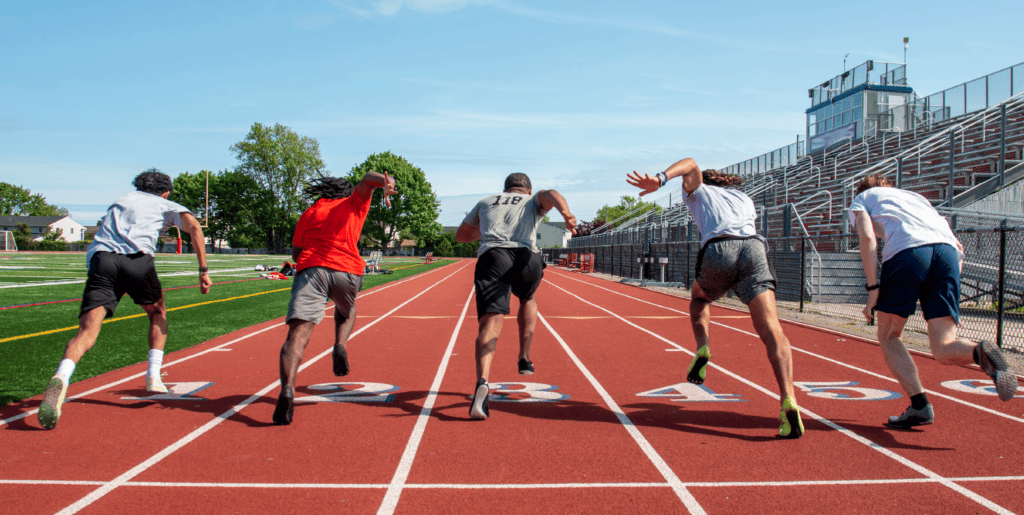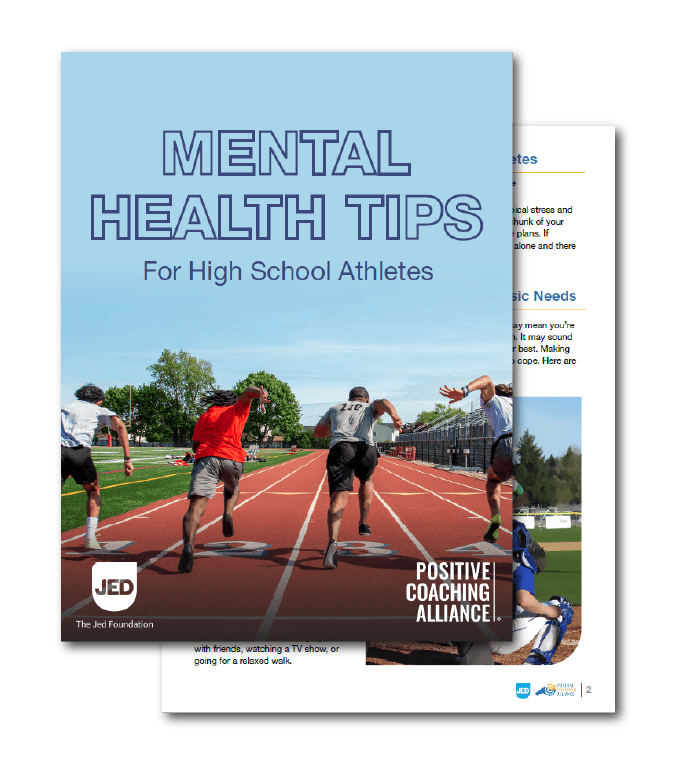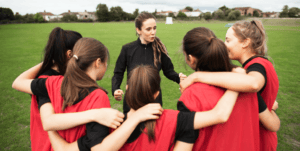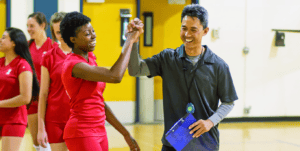PCA Resource zone
Mental Health Tips for High School Athletes

The Jed Foundation in partnership with Positive Coaching Alliance

(For the downloadable version of this toolkit, click here.)
If you’re an athlete, you’re probably dealing with extra pressure on top of the typical stress and challenges of high school. That makes sense. High school sports require a big chunk of your time, and they often come with expectations about your performance and future plans. If balancing athletics and your regular life feels hard or overwhelming, you are not alone and there are things you can do to relieve that pressure.
Pay Attention to Your Sleep and Other Basic Needs
Juggling schoolwork, practices, and games while still having time for yourself may mean you’re
skimping on sleep. That can have a huge effect on your mood and mental health. It may sound
hard, but your body and mind need eight to 10 hours of sleep to function at their best. Making
sleep a priority can make a big difference in your day-to-day mood and ability to cope. Here are
three ways to do it:
Set a bedtime that allows you to get enough sleep and stick to it.
Put your devices away at least a half hour (and preferably a full hour) before bedtime. Charge them overnight in a central household spot, not in your bedroom.
Silence notifications on your phone so they don’t wake you up. Your body and mind also need rest and recovery after workouts, practices, and games. If you don’t give yourself enough time to recharge, you’ll feel depleted and less able to cope with setbacks and perform at your best. Build in some downtime during which you’re not focused on being productive, whether it’s hanging out
with friends, watching a TV show, or going for a relaxed walk.
Manage Anxiety On and Off the Field
It’s normal for all students to deal with anxiety from time to time. As a student-athlete, however, you may face unique situations that lead to stress or discomfort, such as the lead-up to a game or making a mistake on the field. Try the tips below to better manage anxious feelings before, during, and after a game, practice, or other event.
Before: Make a list of things you need to do to feel successful. Maybe it’s setting up your equipment the morning before a game, so you don’t forget anything or identifying ways you’d manage your feelings if the first half goes poorly. Doing that gives you a sense of control and reminds you that you have the resilience and foresight needed to cope.
During: Try an in-the-moment mindfulness exercise, such as box breathing. Inhale for a count of four, hold for four with your lungs full, exhale for four, and hold for four with your lungs empty. While breathing, visualize yourself doing well in your sport, whether it’s making a shot or hitting a home run.
After: Do something you find enjoyable and restorative, such as reading, watching a feel-good movie, stretching, meditating, or something else.
Pay Attention to How You Talk to Yourself
The way you speak to and about yourself — even in your head — has an impact on how you feel. Take a second to think about what kinds of things you say to yourself. Do you engage in positive or negative self-talk?
Negative self-talk can harm your sense of self and performance in your sport and beyond. If you notice you’re engaging in negative self-talk, use these three steps to transform it to be more positive:
- Notice when you have a negative thought but try not to beat yourself up for it. We all have negative thoughts.
- Dig into the negative thought. What feeling is hiding under the thought?
- Rework it into something positive, but realistic.
If you think, “I’m a bad player because I didn’t make that basket,” for example, a more positive reframe would be, “I feel like I should have made that basket, but I’m the kind of person who will work hard to make one in the future.”
Look at Mistakes as Opportunities to Learn
Losing a big game, making an errant pass, or missing a key play can feel like the end of the world, but it doesn’t define who you are as an athlete or person. Try to reframe those mistakes and losses as opportunities to grow as a player or team. Results won’t always go your way, so focusing on putting in your best effort and learning from missteps can only help you get better on and off the field.
Learning to cope with failure is part of playing sports and something even the most high-profile athletes go through. That doesn’t make it feel any less intense, though, so give yourself an emotional break afterward. Let yourself feel whatever you are feeling. Then, when you’ve moved through that part, you can go back and think about what happened to figure out what you might do differently next time. You may even review game tapes with the guiding question, “What tweaks can I make to my play to feel more confident on the field?”
Find Ways to Stay Involved When You’re Injured
If you’re sidelined because of an injury, you can still play an active role on your team. Maybe you can help coach up your replacement, film practices, track times, or simply be another set of eyes to assist the coach — whatever feels fulfilling and helps the team while maintaining your recovery. You’ll still be part of the team’s daily activities, and you may even develop some new skills.
Support Your Teammates
Everyone shows up to practices or games within the context of their day. Your teammates may also be dealing with test anxiety, stress about part-time work or school, or worry after a tough family conversation.
Pay attention to your teammates and offer them support, especially if they are coming to practice after a hard day. Show them you care by listening to their perspectives and validating their feelings. You might say something like, “That sounds really hard,” or, “Exams are stressful — I’m feeling it too.” Connecting with your teammates helps not only help them, but also you.
Do Things Outside of Your Sport
Finding time for other activities can be hard, but it provides much-needed balance. Think about what else you enjoy and try to build in time for it. Whether it’s playing another sport just for fun or hanging out with friends, having outside interests and relationships helps you recharge and get a break from the intensity of competition. They’re also a reminder that being an athlete is just one aspect of who you are.
Get Support When You Need It
If you’re struggling, consider reaching out to a trusted adult, whether it’s your coach, your team’s athletic trainer, a parent or caregiver, or your school counselor. They can help you come up with specific steps
to reduce the pressure and help you brainstorm what kind of support you need. Sometimes just being able to open up to someone about what’s bothering you and how you’re feeling can be a relief.
If the way you’re feeling doesn’t change, starts to make it hard for you to do other things in your life, or makes you feel consistently unhappy, talking with a mental health professional can be a big help.
Learn more about how therapy can help and how you can find it.
If you are struggling with thoughts of hopelessness or suicide, you are not alone and there are lots of ways to begin to feel better.
If you need help right now, text HOME to 741-741 for a free, confidential conversation with a trained counselor any time of day. If you or someone you know is experiencing a mental health crisis, including suicide or a substance use crisis, text or call 988 or use the chat function at 988lifeline.org.
Learn More About Supporting Your Mental Health as a Student or Student Athlete
- How to Deal With the Pressures of Being a High School Athlete
- Playing Sports in College: What to Know
- Can I Be Anxious Without Having an Anxiety Disorder?
- 8 Ways to Lower Stress in High School
- 6 Ways to Take Care of Yourself During Exam Time
About The Jed Foundation
The Jed Foundation (JED) is a nonprofit that protects emotional health and prevents suicide for our nation’s teens and young adults. We partner with high schools and colleges to strengthen their mental health, substance misuse, and suicide prevention programs and systems. We equip teens and young adults with the skills and knowledge they need to help themselves and each other. We encourage community awareness, understanding, and action for young adult mental health. Learn more and access resources at jedfoundation.org.
About Positive Coaching Alliance
PCA’s vision is to build a world where youth benefit from a positive sports experience with a coach who inspires them to become the best version of themselves in the game and in life. We train coaches and partner with youth sports organizations, parents, sports leaders, and communities to make youth sports more positive, equitable, and accessible to all kids regardless of social or economic circumstances. For more information, go to positivecoach.org.







